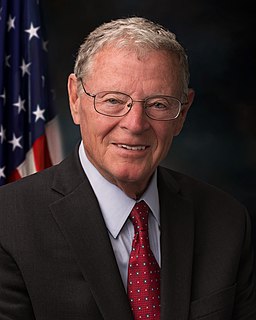A Quote by Jim Inhofe
A country's adhering to the rule of law does not mean that its citizens will not do bad things.
Related Quotes
The rule of law means that law and justice are upheld by an independent judiciary. The judgments of the European Court of Justice have to be respected by all. To undermine them, or to undermine the independence of national courts, is to strip citizens of their fundamental rights. The rule of law is not optional in the European Union. It is a must.
Good, healthy democratic societies are built on three pillars: there's peace and stability, economic development, and respect for rule of law and human rights. But often, we take stability - peace in terms of security and economic activity - to mean a country is doing well. We forget the third and important pillar of rule of law and respect for human rights, because no country can long remain prosperous without that third pillar.
The United States will always be a global leader, and we need to actively engage the international community to make sure all citizens of the world live freely and equally under their country's rule of law. We cannot, however, afford to fight other nations' wars interminably or stabilize their regions.
10 Rules for Being Human: Rule #1 - You will receive a body. Rule #2 - You will be presented with lessons. Rule #3 - There are no mistakes, only lessons. Rule #4 - The lesson is repeated until learned. Rule #5 - Learning does not end. Rule #6 - "There" is no better than "here". Rule #7 - Others are only mirrors of you. Rule #8 - What you make of your life is up to you. Rule #9 - Your answers lie inside of you. Rule #10 - You will forget all this at birth.
We need a witness to our lives. There's a billion people on the planet... I mean, what does any one life really mean? But in a marriage, you're promising to care about everything. The good things, the bad things, the terrible things, the mundane things... all of it, all of the time, every day. You're saying 'Your life will not go unnoticed because I will notice it. Your life will not go un-witnessed because I will be your witness'.
It is the collective responsibility of the citizens in a modern state to ensure by all means necessary that its government adheres to the rule of law, not just domestically, but internationally. There are no bystanders. No one is entitled to an 'apolitical' exemption from such obligation. Where default occurs, either by citizens endorsement of official criminality or by the failure of citizens to effectively oppose it, liability is incurred by all
Democracy only has substance if there's the rule of law. That is, if people believe that the votes are going to be counted, and they are counted. If they believe that there's a judiciary out there that will make sense of things if there's some challenge. If there isn't rule of law, people will be afraid to vote the way they want to vote.
The rule of law does not guarantee freedom, since general law as well as personal edicts can be tyrannical. But increasing reliance on the rule of law clearly played a major role in transforming Western society from a world in which the ordinary citizen was literally subject to the arbitrary will of his master to a world in which the ordinary citizen could regard himself as his own master


































